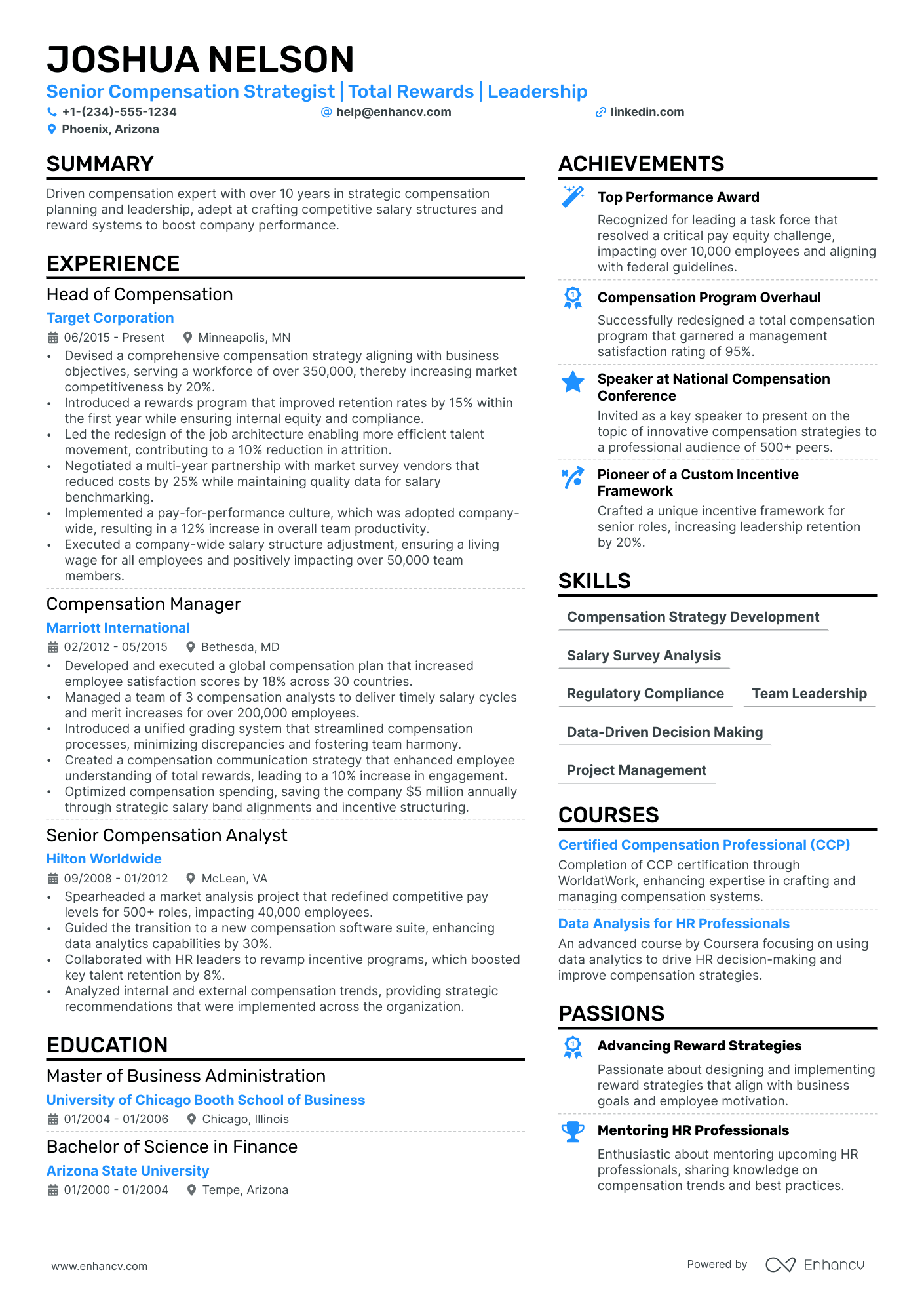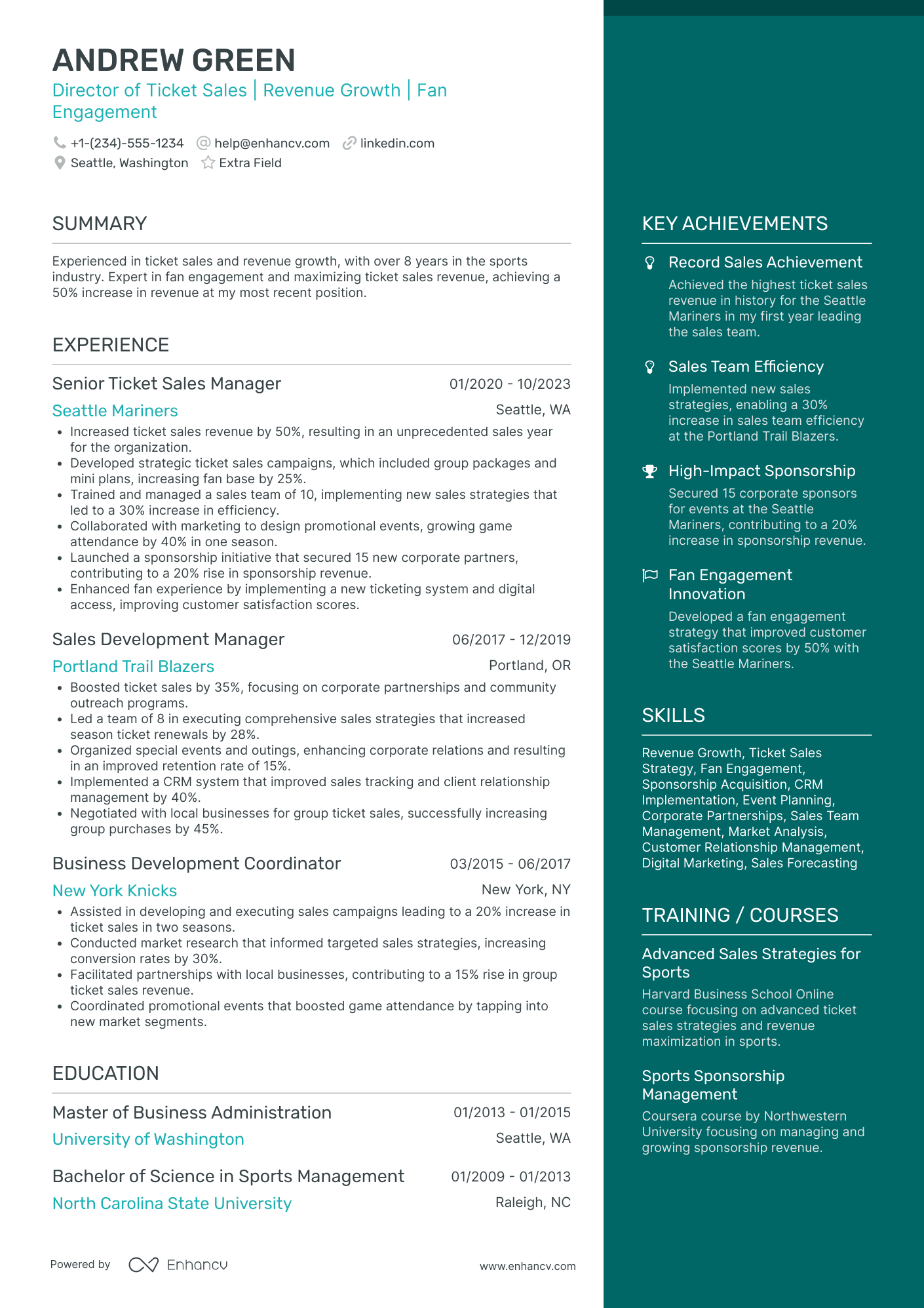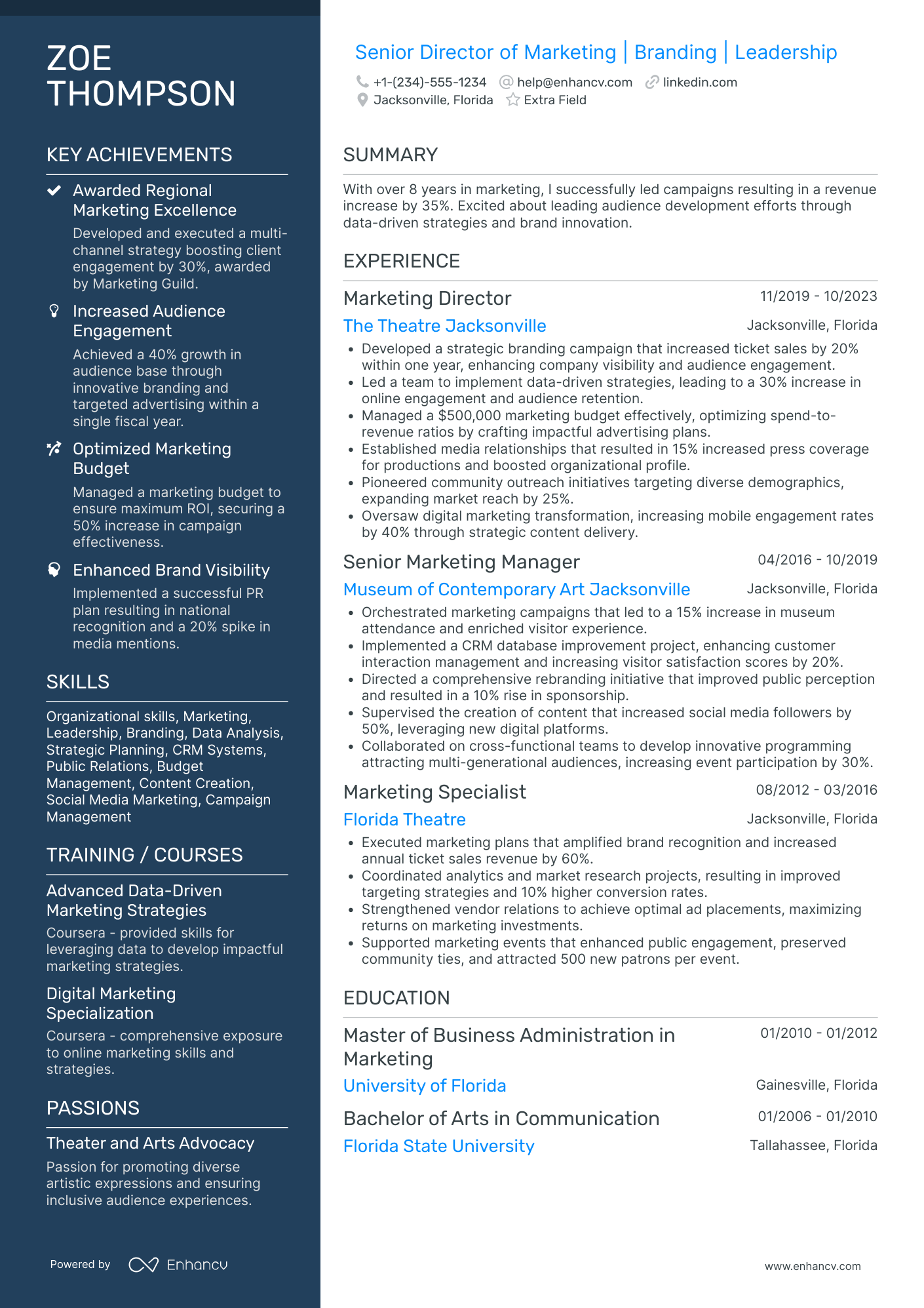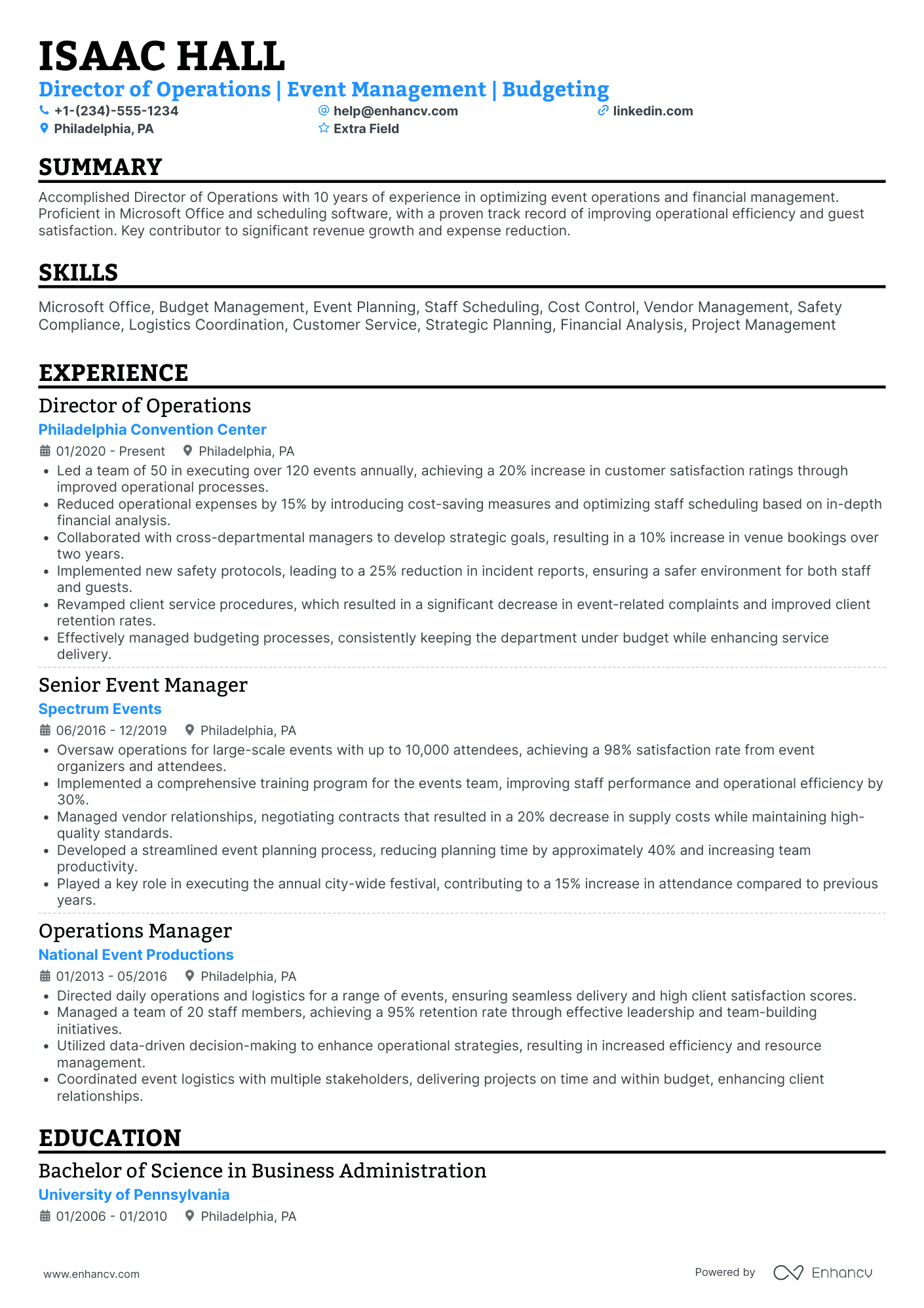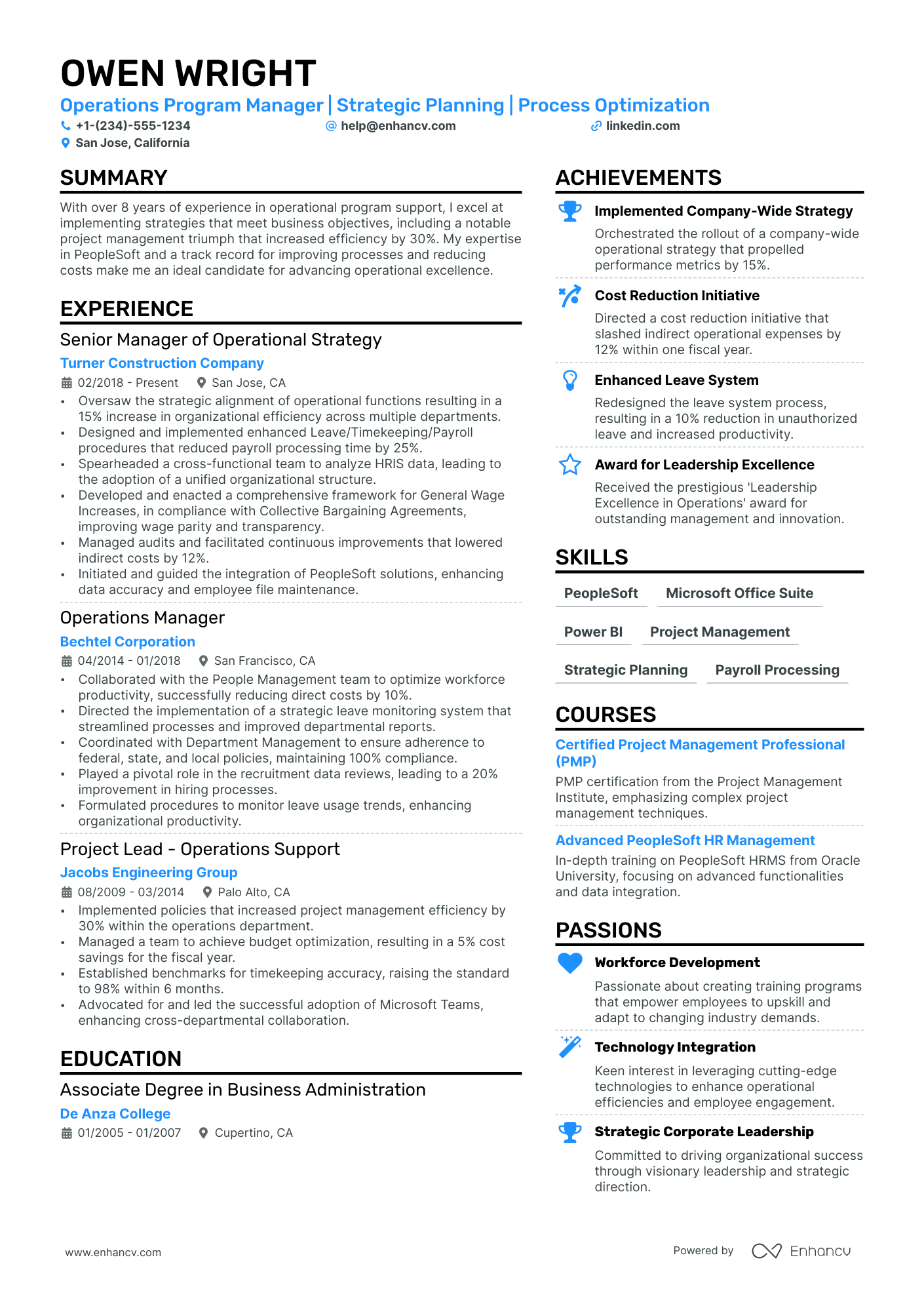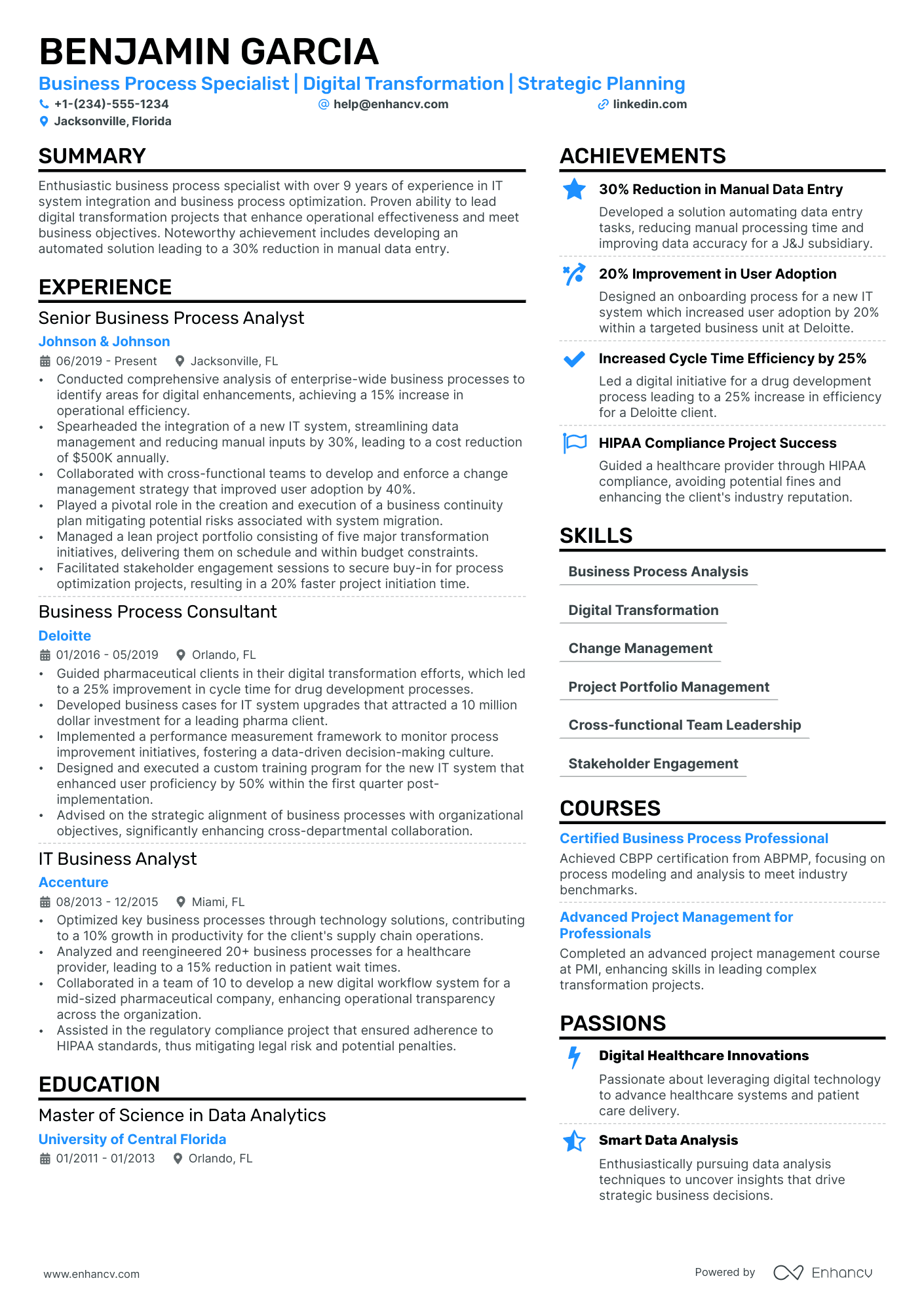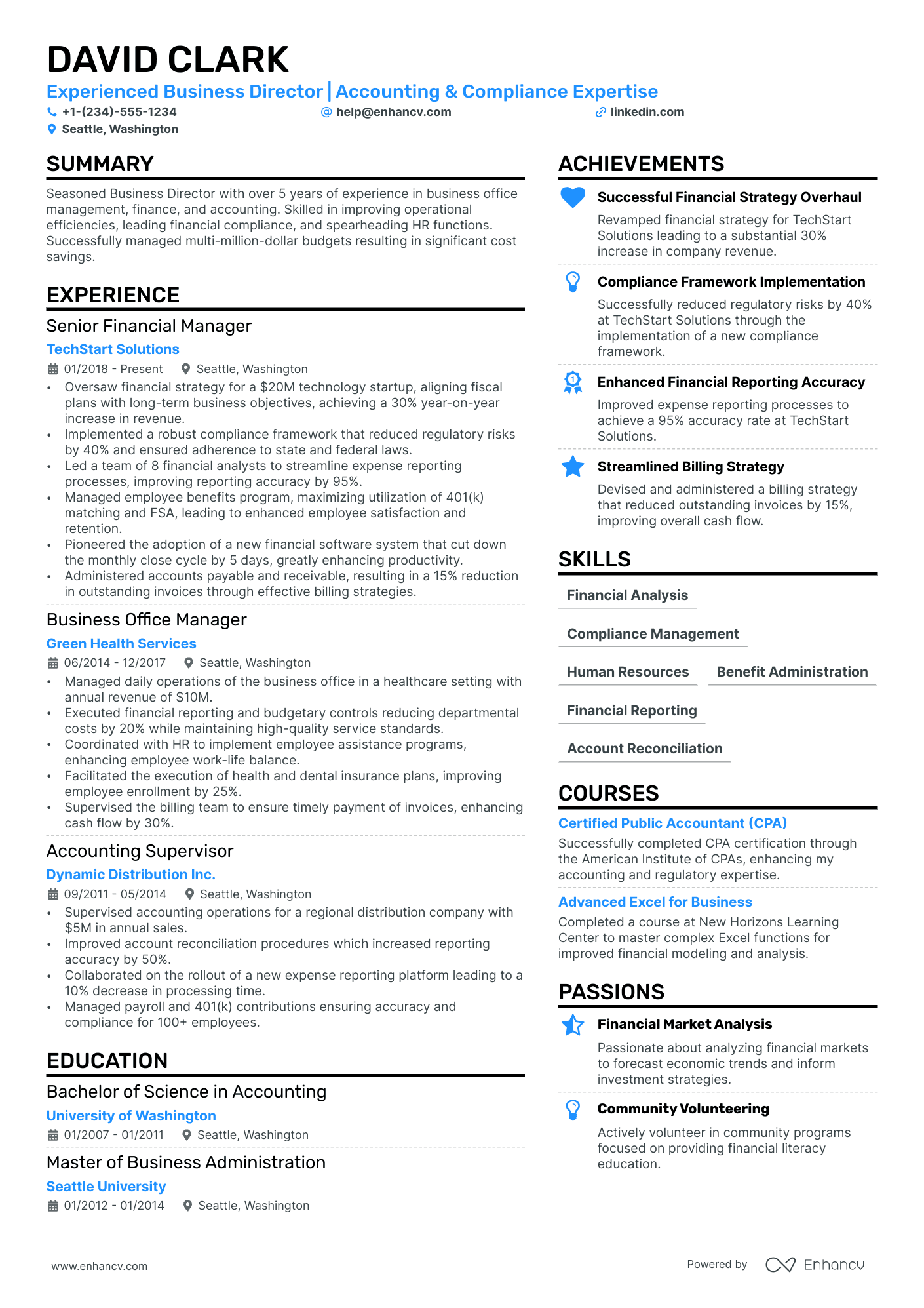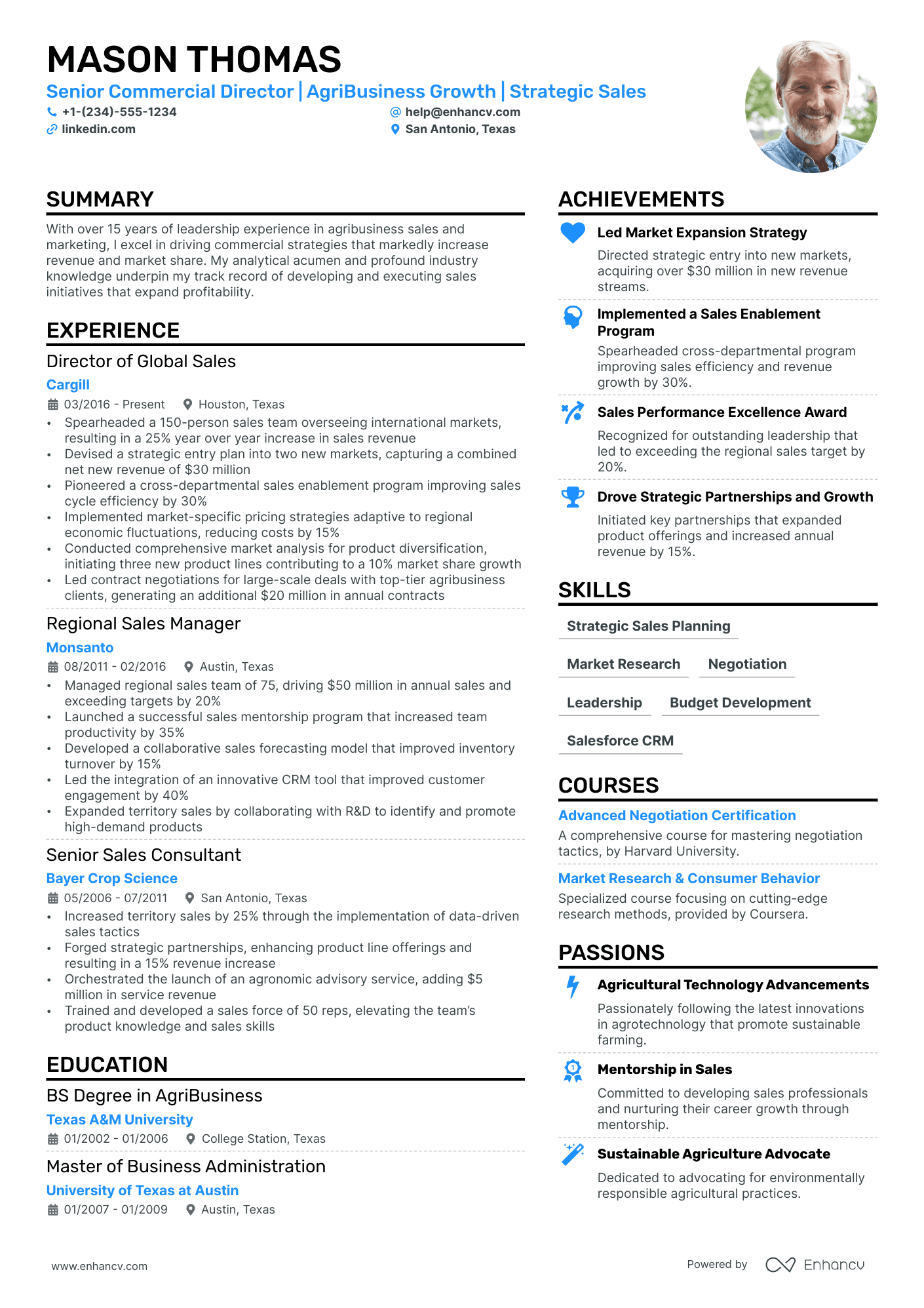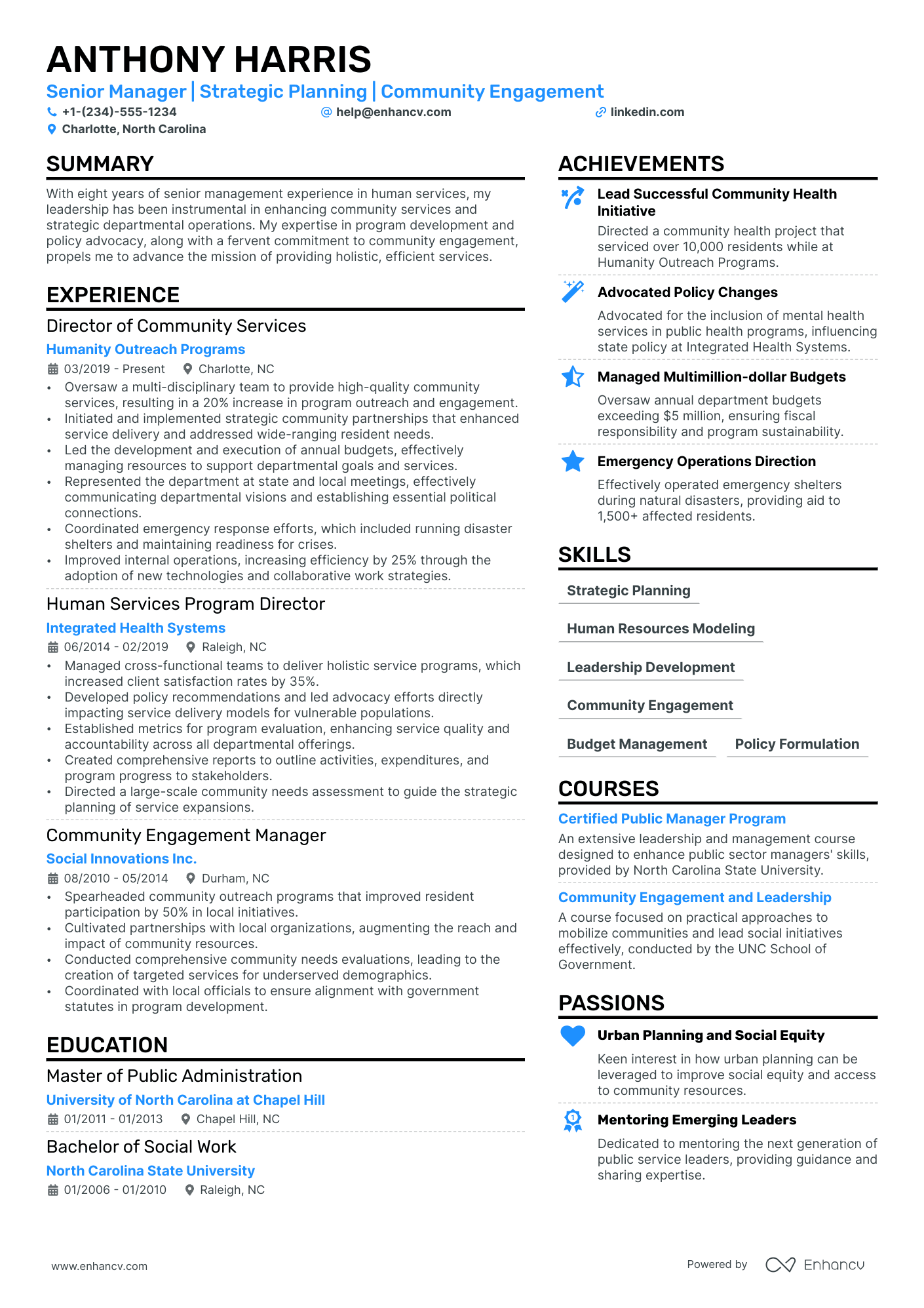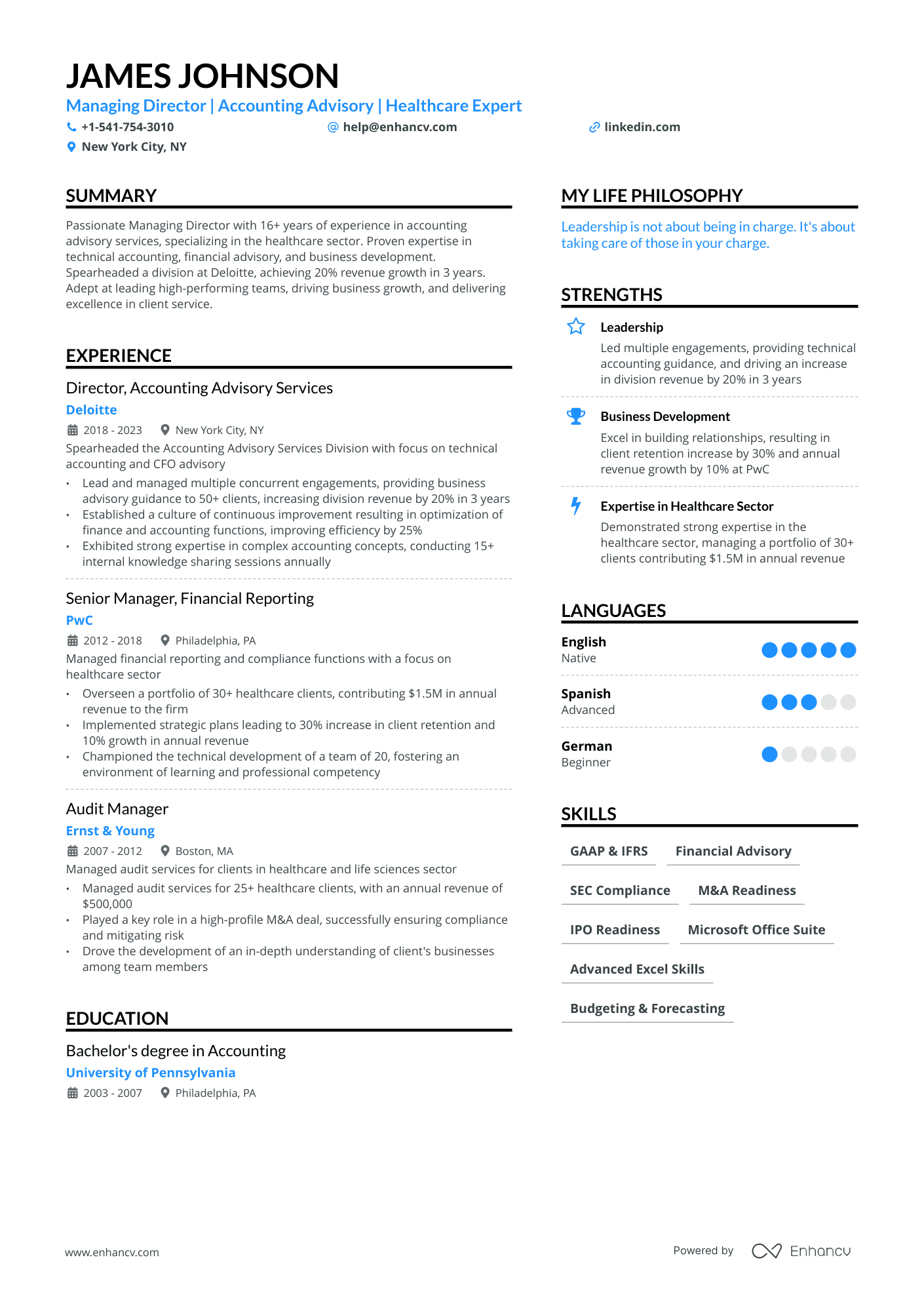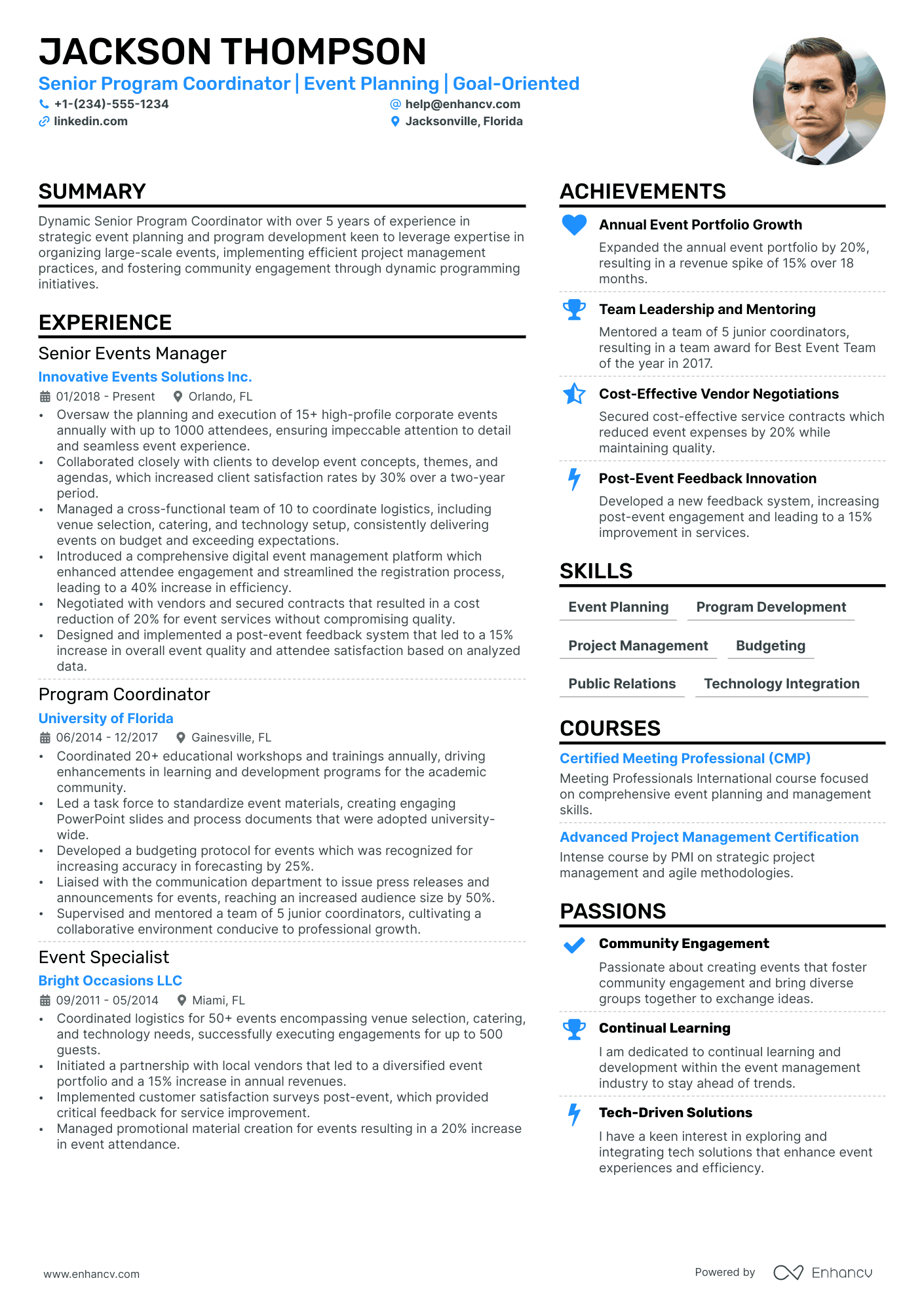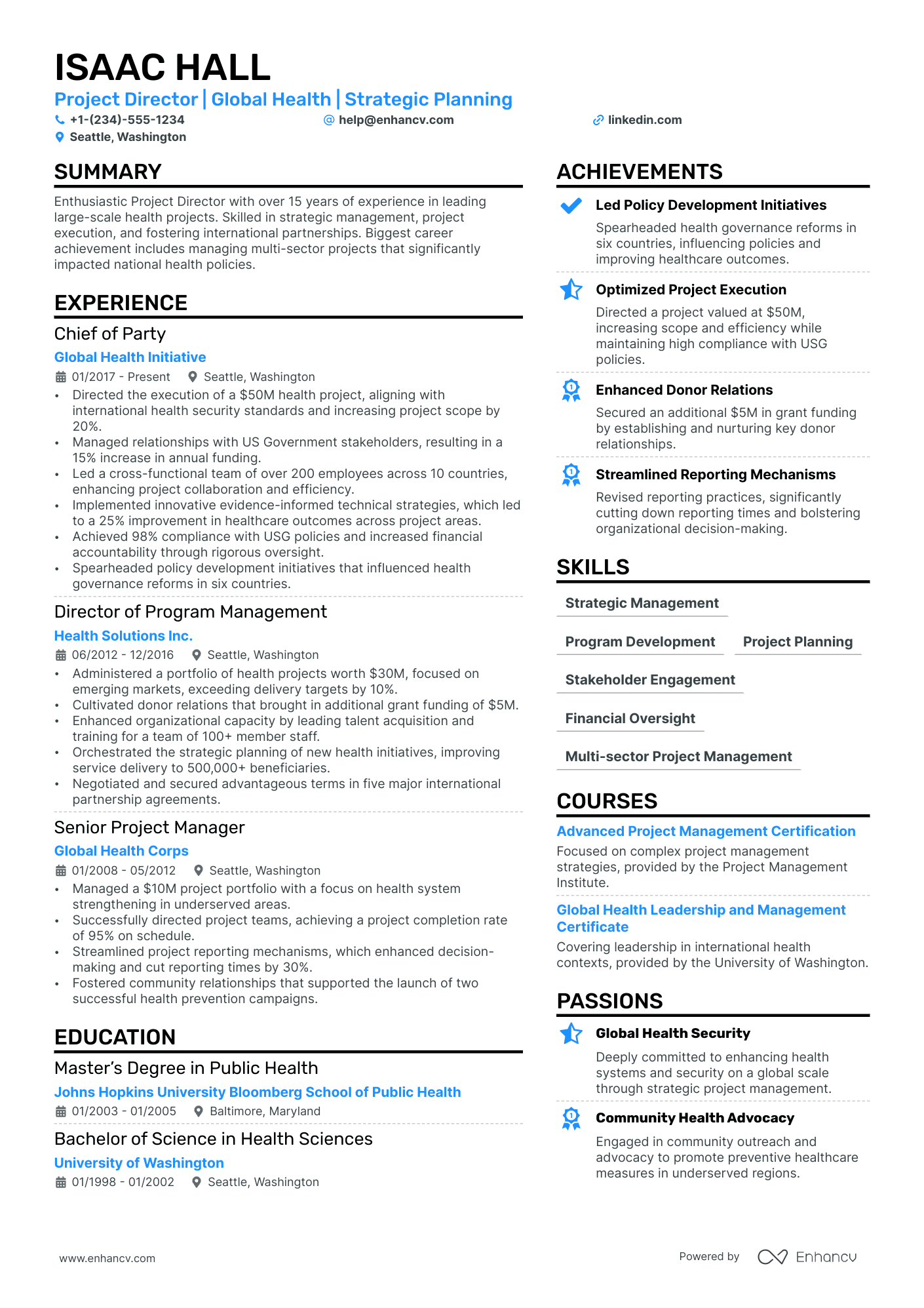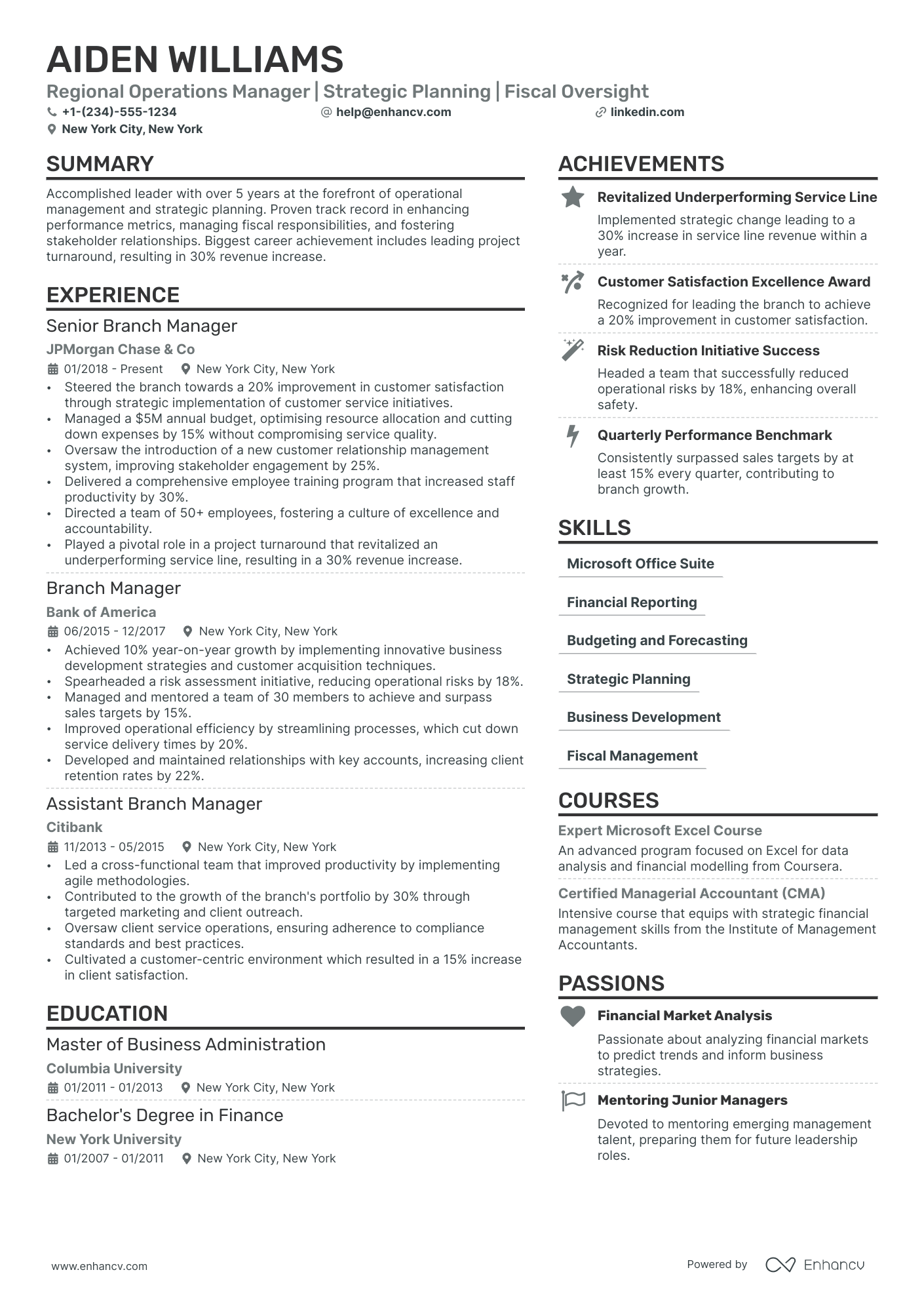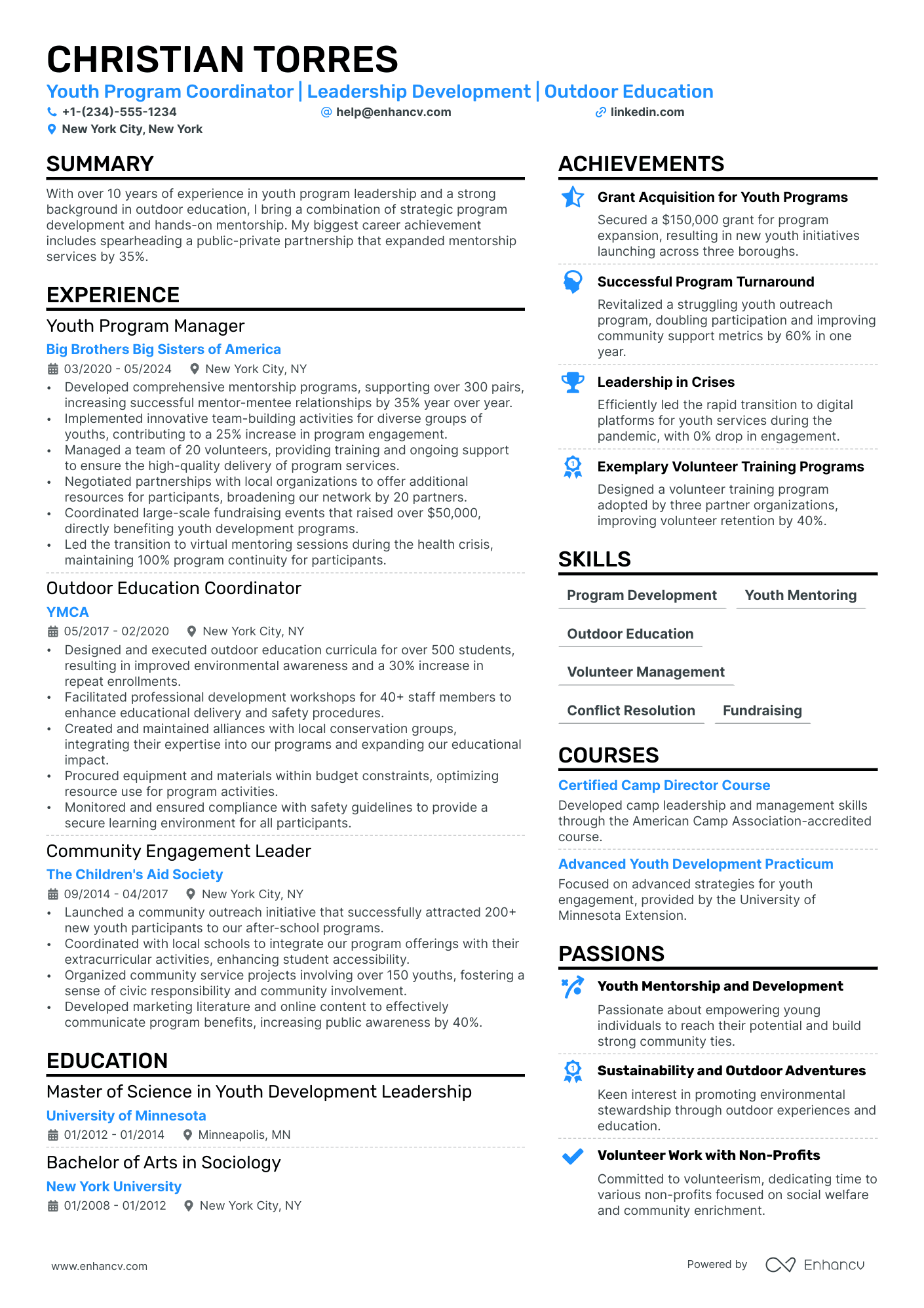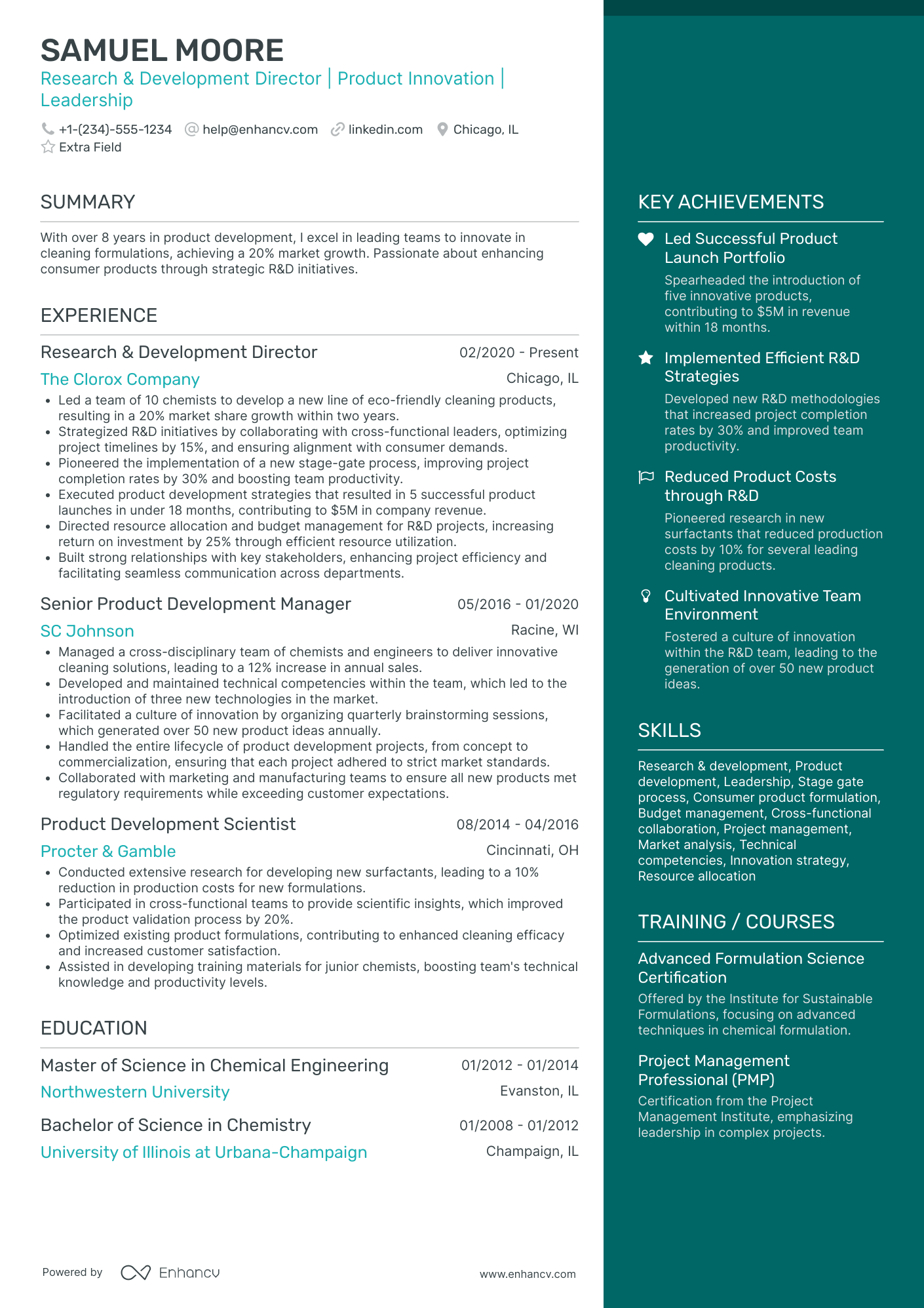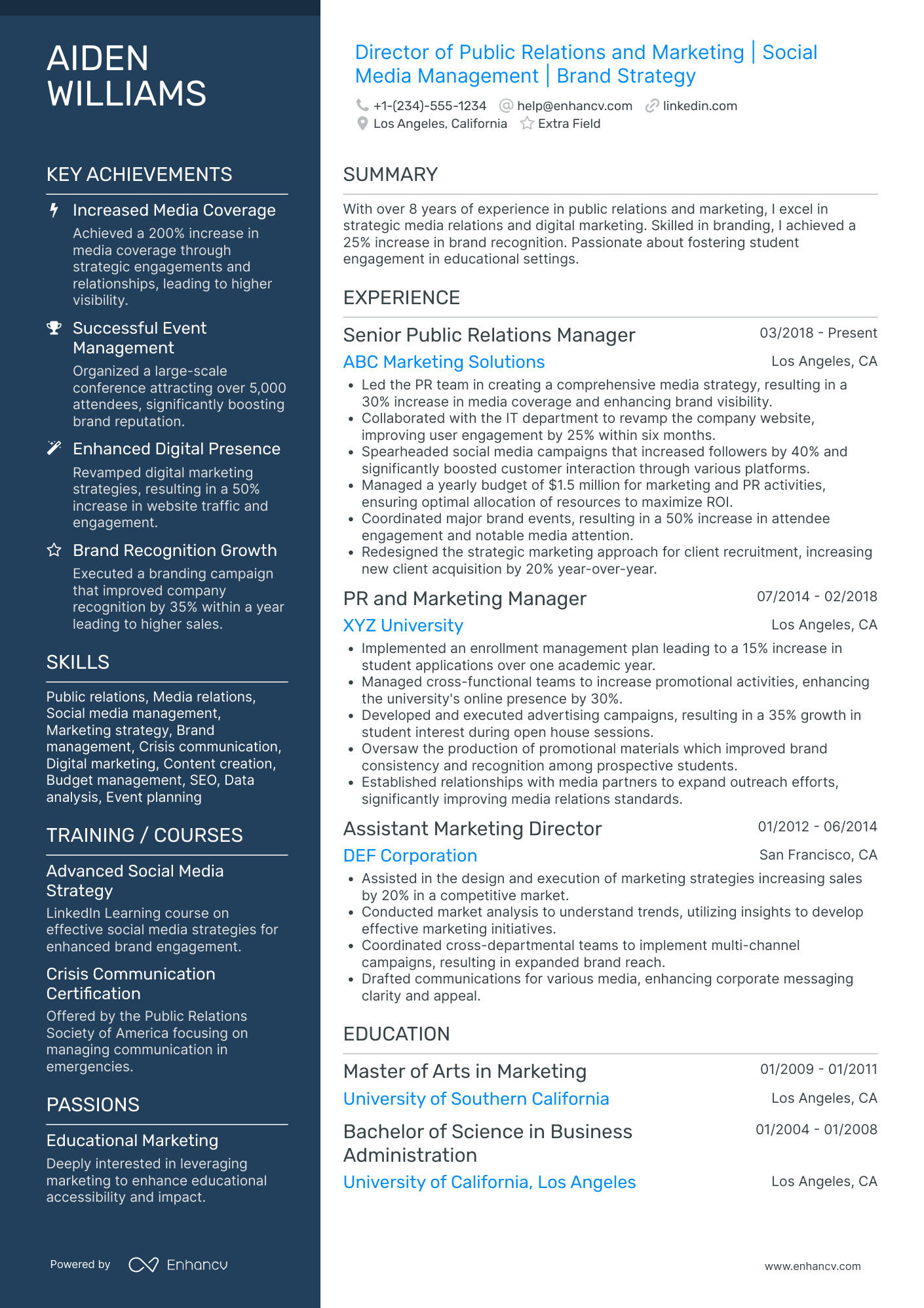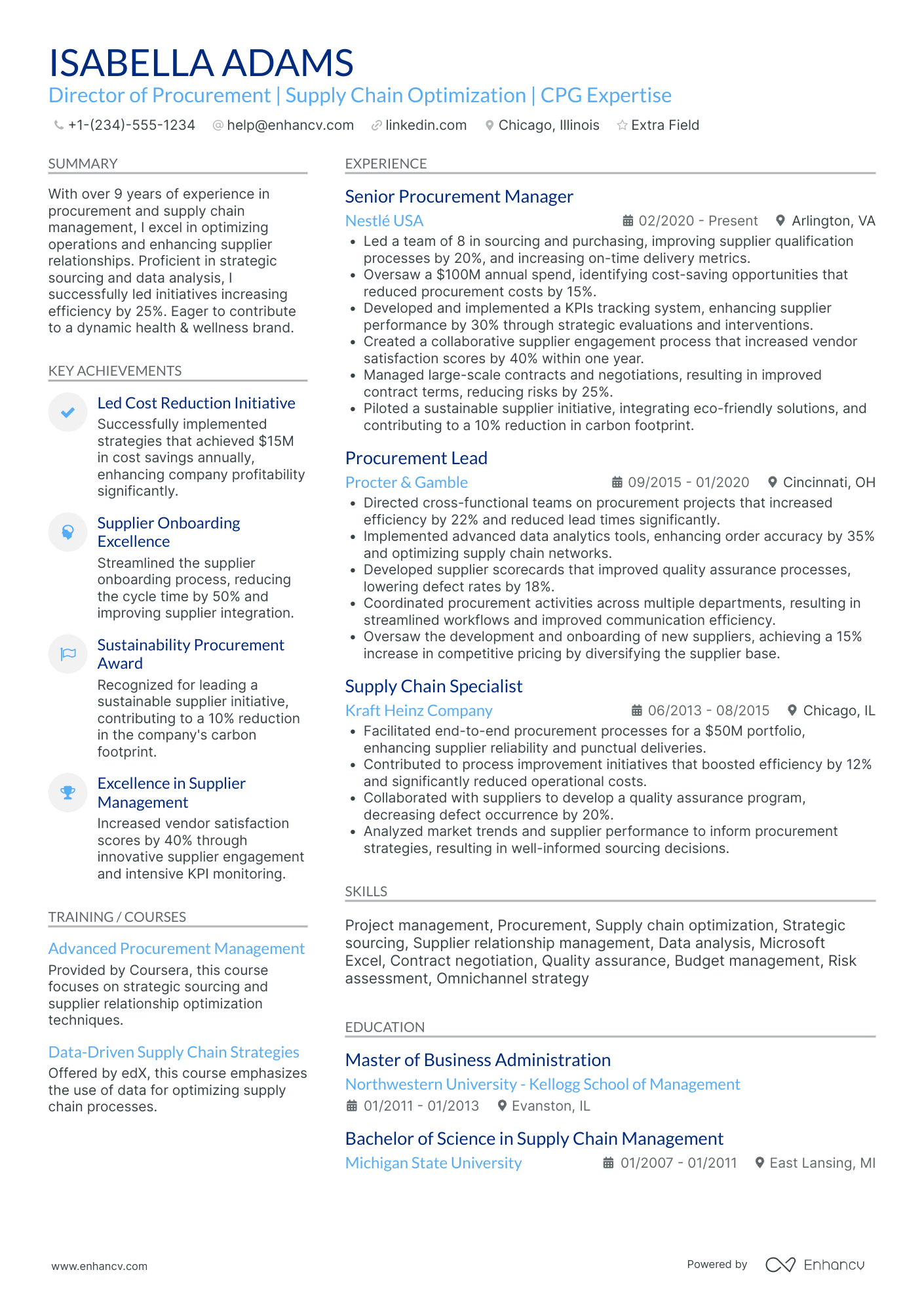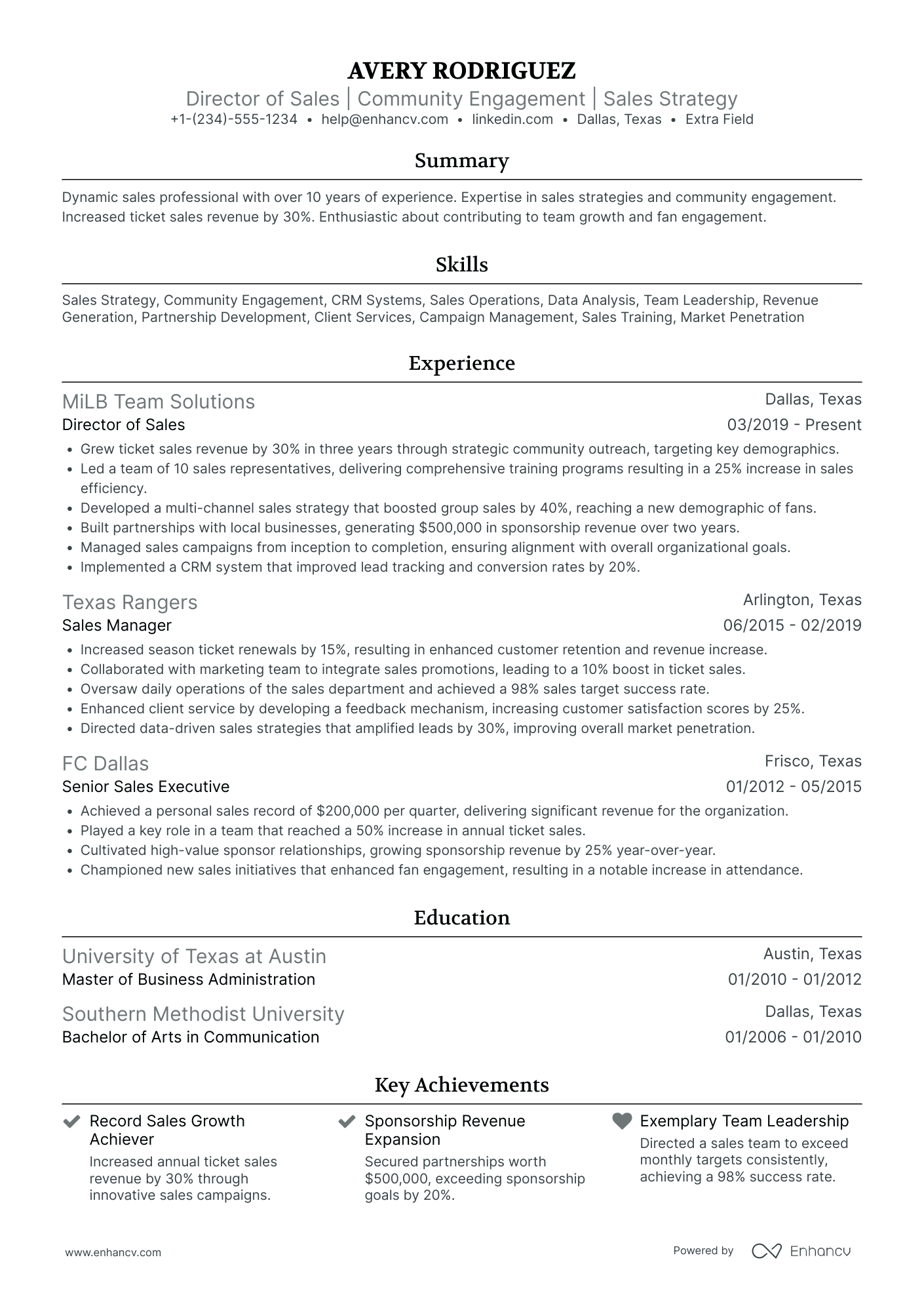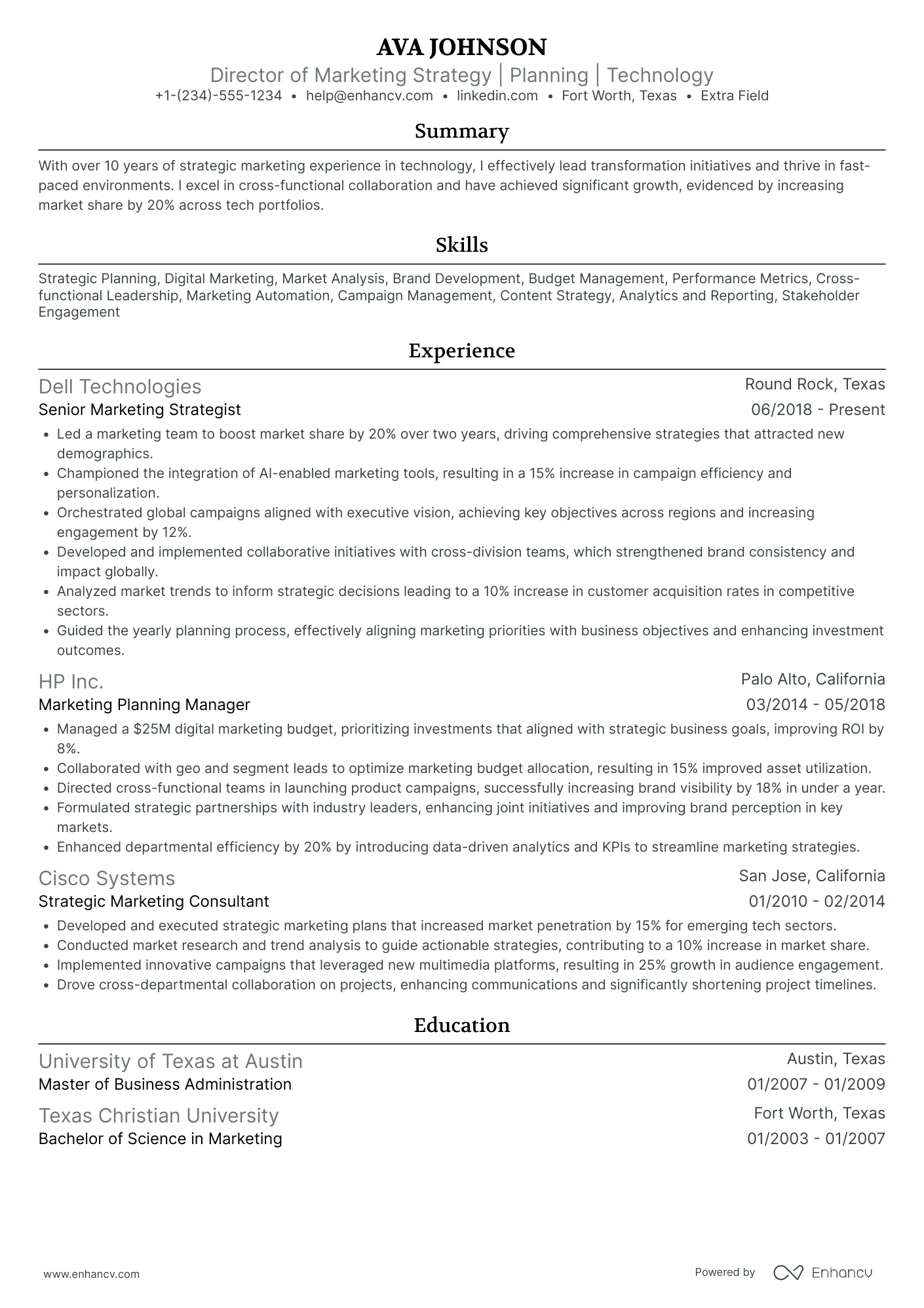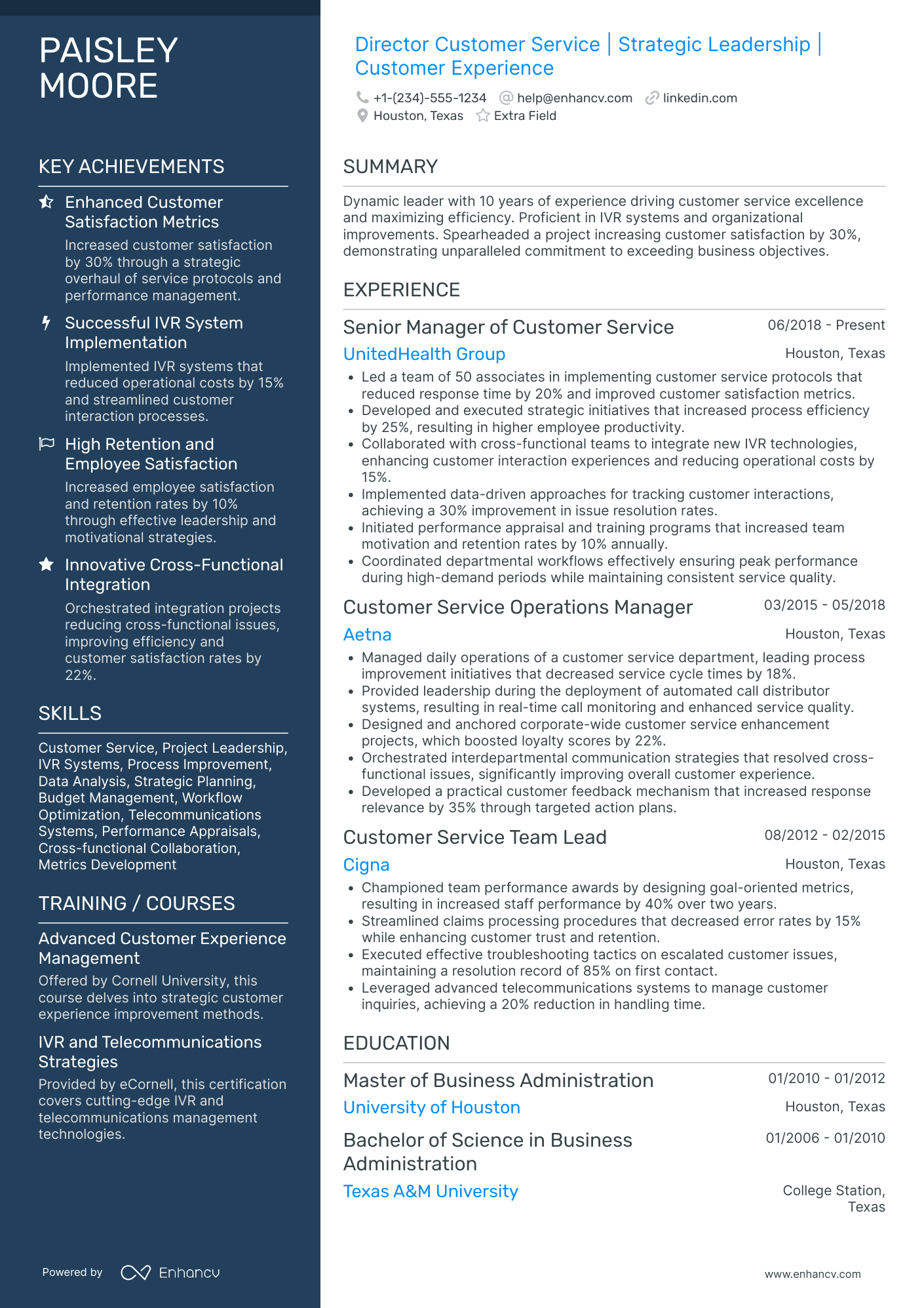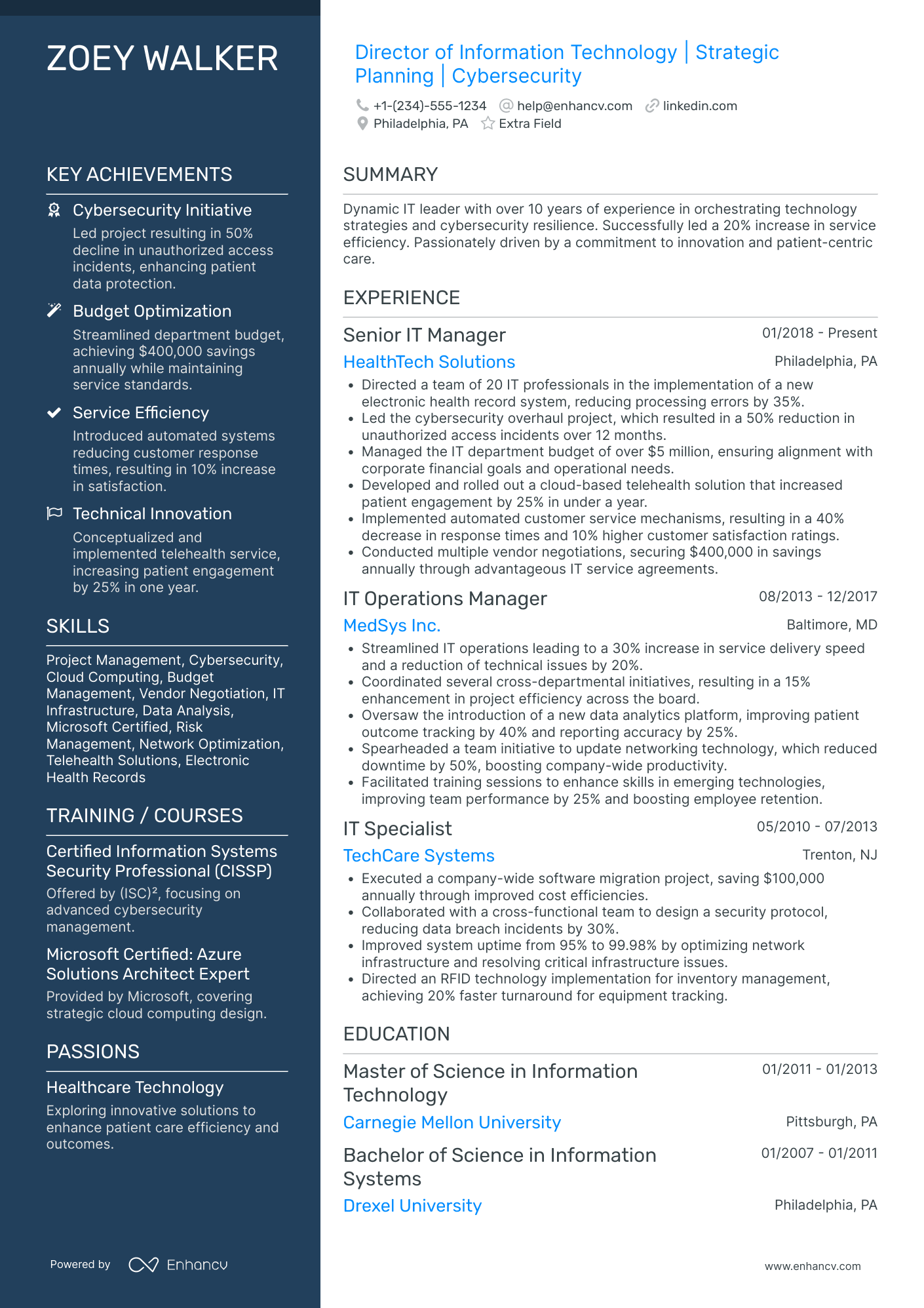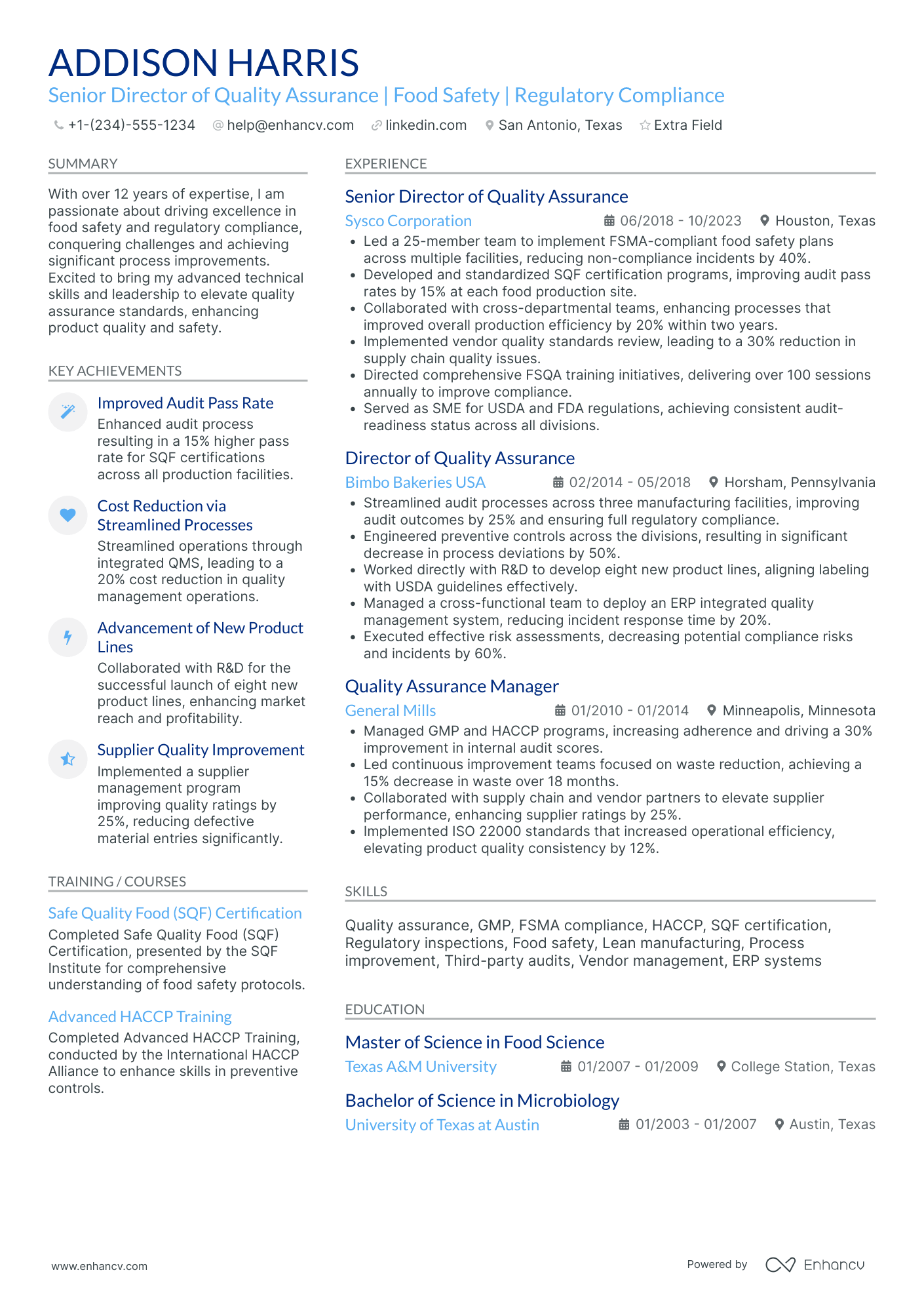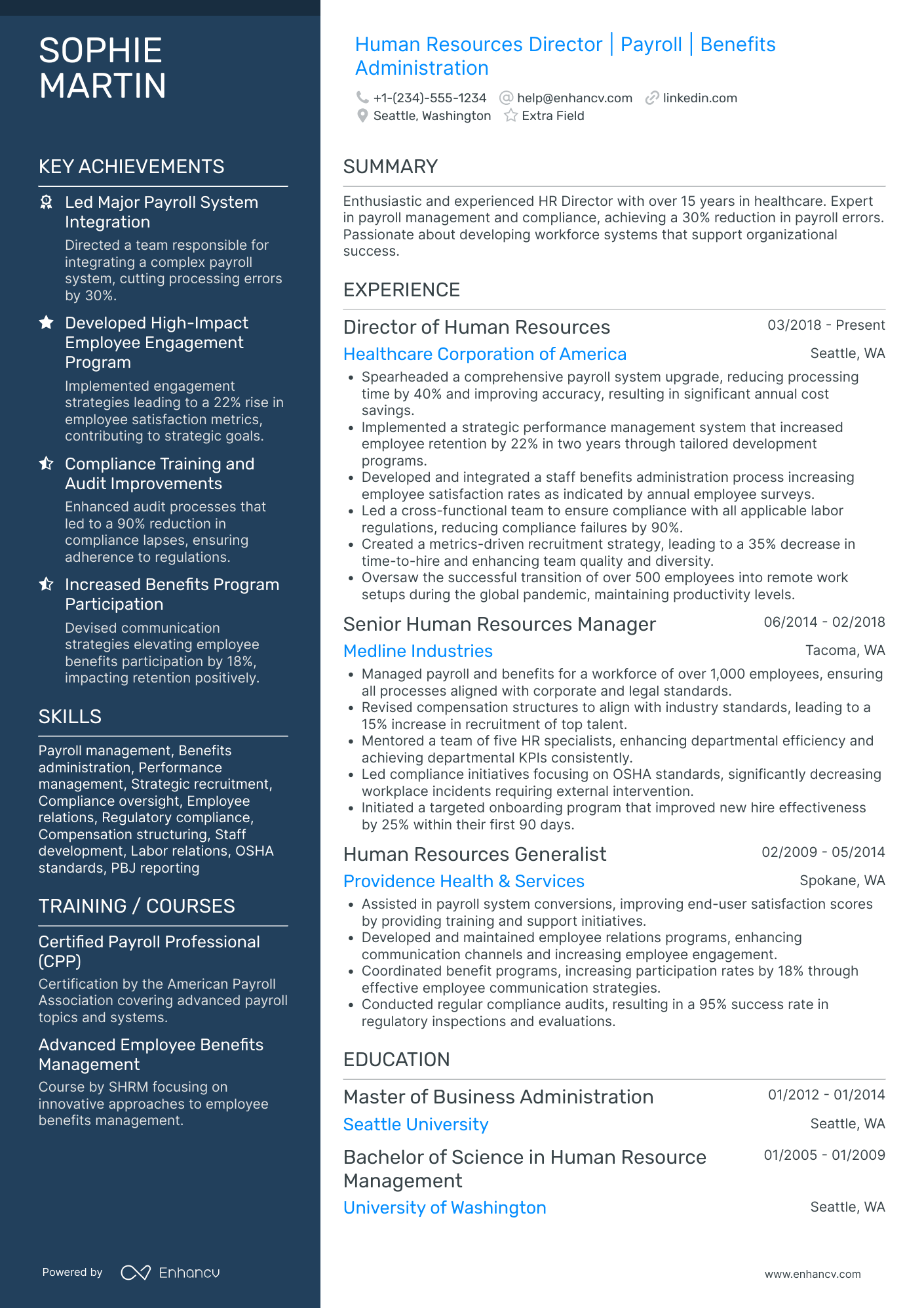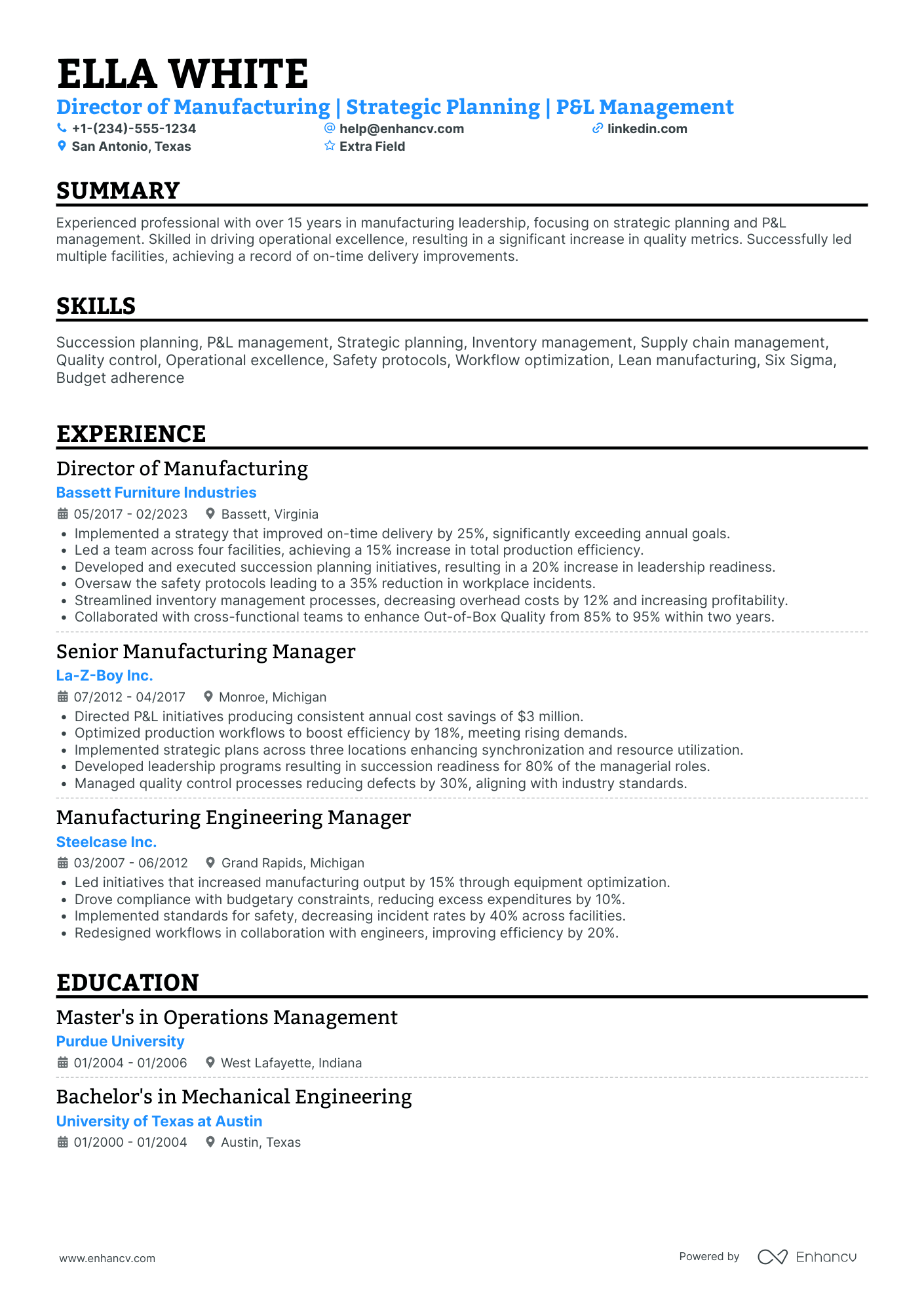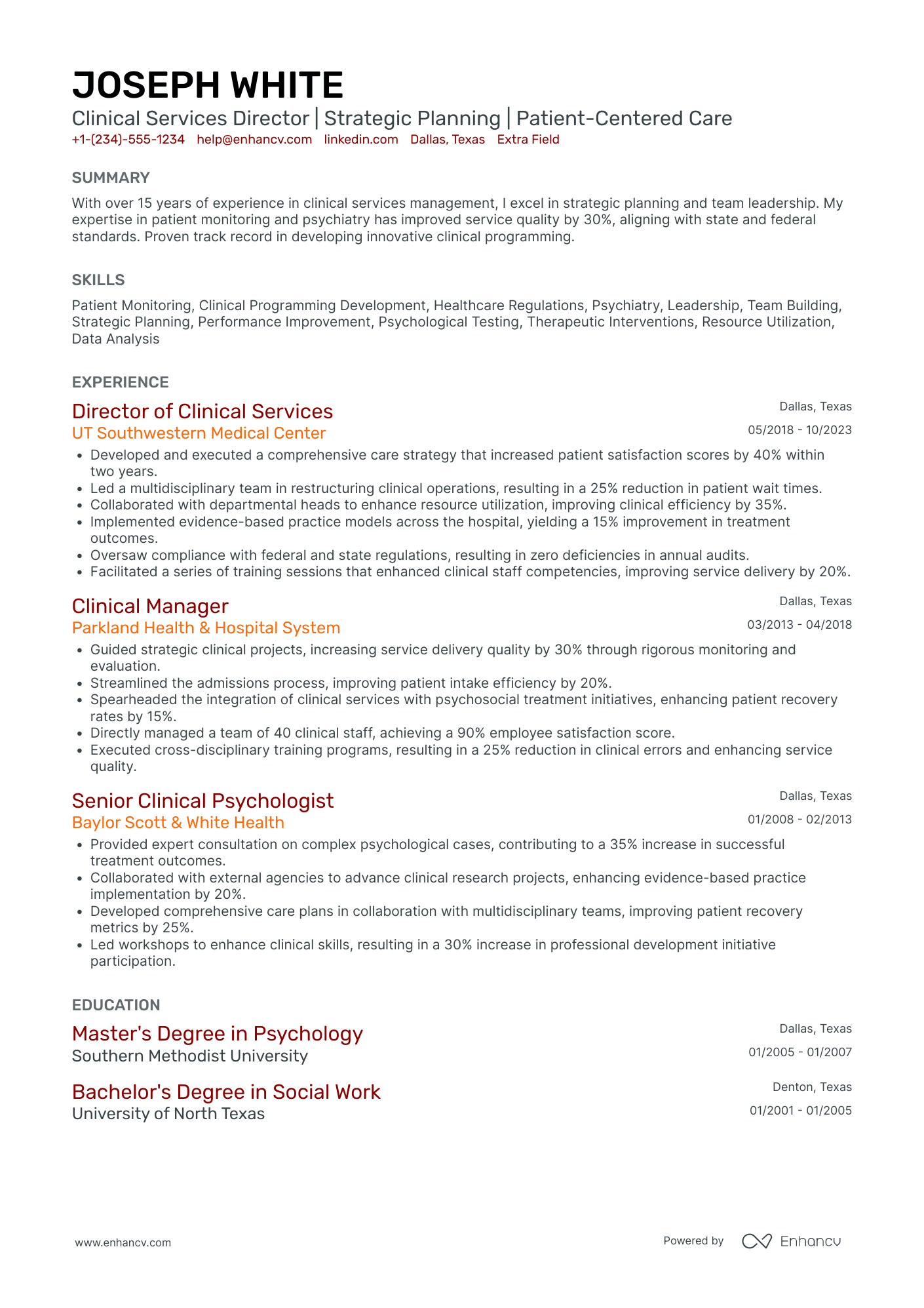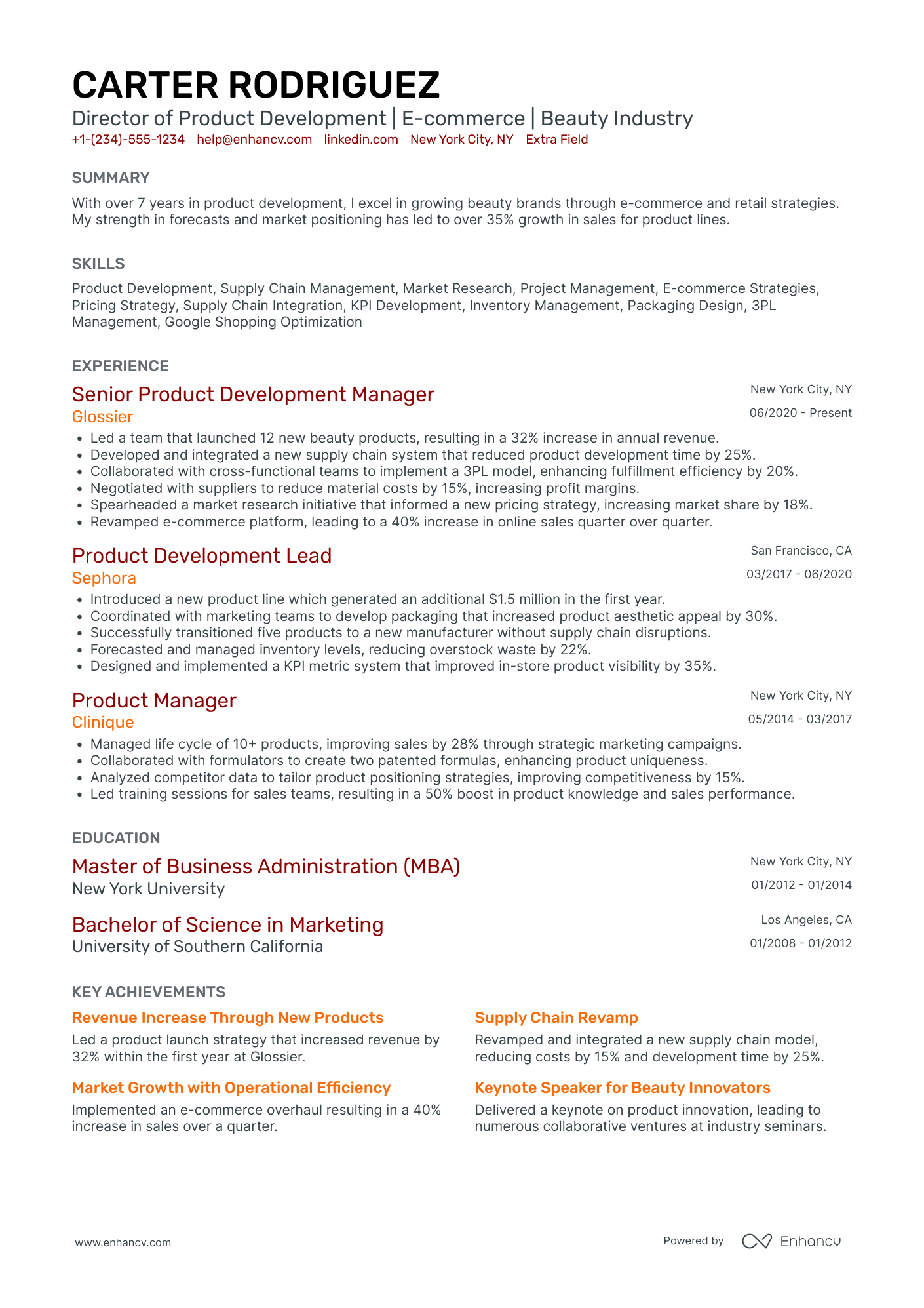Finding a new job as a director can be a daunting task. Most directors have to rely on their network to find a new position at a level where there are already limited opportunities.
Your director resume needs to clearly demonstrate leadership capabilities and a proven track record in your industry.
Hiring managers won’t waste time with a dull resume when they have a network of qualified directors to choose from. Create a resume that makes it clear that you’re the right candidate.
In this guide, you’ll learn:
- How to format your director resume so that hiring managers see your impressive career commitment and growth
- The right way to present your skills so that potential employers will see that you have the right skill set to impact success
- How to highlight achievements that are relevant to directorial roles and communicate your value in the industry
- How to grab recruiters’ attention with a strong summary that captures your career accomplishments as well as what you will bring to the position
If you’re looking for a more specific executive position resume, check out some of our other examples:
Director resume examples
By Experience
Senior Director
Senior Director of Sales
Senior Director of Marketing
Senior Director of Operations
By Role
Assistant Director
Associate Director
Business Director
Commercial Director
Deputy Director
Managing Director
Program Director
Project Director
Regional Director
Training Director
Director of Research and Development
Director of Public Relations
Director of Procurement
Director of Sales
Director of Marketing
Director of Customer Service
Director of Product Development
Director of Information Technology
Director of Quality Assurance
Director of Human Resources
Director of Manufacturing
Director of Clinical Services
How to format a director resume
Organized formatting and a clear message are crucial to a strong resume. It’s the first thing recruiters notice when they look at your resume and first impressions carry a lot of weight.
Companies will expect that directors have a strong career trajectory and proven track record. Your director resume should communicate this clearly.
Here are a few areas to focus your attention when formatting your resume for director level roles:
- Reverse chronological layout - Like the name suggests, a reverse chronological resume puts the central focus on your work history in a reverse timeline. Hiring managers will see consistent career growth and your path to directorial level positions.
- Header - the top of your resume should include a brief but important header that introduces your job title and provides professional contact information. Avoid using your current work email address. You don’t want to tip off your assistant that you’re applying to other jobs. Use a personal but professional email address like firstname.lastname@gmail.com.
- Key achievements - your most important sections need to stand out if you want to make it to the interview stage. Highlight industry achievements and leadership skills to show your value in your field. More on important sections below.
- Limit to one page - just because you can fill pages and pages with your work experience doesn’t mean you should. Recruiters are busy and don’t want to comb through every job you’ve ever had. Include only the strongest and most relevant information on your director resume and tailor every section to fit your target job.
When your resume is ready for the world, use a PDF file format instead of Doc. This ensures preservation of that formatting you worked so hard on.
Tailor your resume format to the job market – a Canadian resume, for example, might differ in layout.
To see how well your current resume holds up, utilize the resume checker in Enhancv’s resume builder.
Is your resume good enough?
Drop your resume here or choose a file. PDF & DOCX only. Max 2MB file size.
The top sections on a director resume:
- Professional Summary: Summarizes your top qualifications and relevance for the director role, helping the recruiter quickly ascertain your suitability.
- Leadership Experience: Highlights your past roles and the leadership capabilities you've demonstrated, showcasing your readiness for director-level responsibilities.
- Strategic Initiatives: Illustrates your ability to conceive, lead, and execute strategic projects, emphasizing your forward-thinking and proactive nature.
- Key Achievements: Presents specific outcomes and results you've driven, underscoring your effectiveness and impact as a leader.
- Relevant Skills & Expertise: Lists specific skills pertinent to director roles, ensuring ATS systems pick up on your most relevant capabilities.
What recruiters want to see on your resume:
- Demonstrated strategic leadership and decision-making capabilities.
- Proven track record of successfully overseeing company operations and fiscal health.
- Significant experience in stakeholder management, including board members, shareholders, and external partners.
- In-depth industry knowledge and foresight to anticipate and navigate market changes.
- Experience in mergers, acquisitions, and corporate restructuring.
How to write your director resume experience
Your resume experience section is where you show your work history along with accomplishments from each job. Each role should include 3-4 bullets highlighting your top achievements.
A common mistake directors make in this section is writing duties instead of achievements. Your experience bullets should include measurable results that show your effectiveness as a leader.
Long multi-page resumes with too many unnecessary details is another error directors often make. It might be difficult to strip down your long career to a few highlights, but prioritization is key.
Let’s look at an example of a director resume experience section.
- •Launched products and increased market share
- •Trained employees in automated ordering system
- •Attended annual staff holiday party
What’s wrong with this section:
- No evidence to support claims - “launched products and increased market share” doesn’t tell potential employers anything about the amount of success you’ll bring to the company. Back up your claims with real measurable results.
- Lacks industry skills - generic tasks like “trained employees” only touches the surface of what hiring managers need to know. Show how this highlights your impact as a leader. <>
- Includes irrelevant information - another common mistake in this section is not tailoring everything to fit the target job. Unless you can show how “attended annual staff holiday party” is somehow evidence of your success, it’s irrelevant and should be left out.
Let’s make a few changes and take another look.
- •Launched 8 new products and increased market share by 25%
- •Trained 35 employees in automated ordering system which increased productivity by 45%
- •Implemented strategic plan to restructure company operations which resulted in an additional $1.2M in revenue
What works in this example:
- Clear evidence of success - “Launched 8 new products and increased market share by 25%” provides hiring managers with a clear, measurable achievement
- Shows industry keywords - successful training and strategic plans are industry skills that show the execution of strong leadership and how the candidate will impact success at their target company
- Mentions specific data - showing specific dollar amounts like “$1.2M in revenue” speak to the candidate’s leadership capabilities as well as fiscal impact
The example above is a great improvement. It communicates key achievements instead of generic roles and responsibilities.
How to quantify impact on your resume
Potential employers want directors who are leaders in their industry and will bring success to their company. Show recruiters that you’re the right fit by quantifying impact on your director resume.
Achieve this by using quantifiable metrics and measurable data when highlighting your successes from previous roles. Using numbers in your resume shows clear results instead of generic claims.
Here are a few areas to consider when referring back to achievements in previous directorial roles:
- Precise number of projects managed or directed, as this quantifies your experience and indicates the breadth of your responsibility
- Budgets you've been responsible for and the total dollar value managed, showcasing your financial stewardship and accountability
- Number of team members you've led or managed, demonstrating leadership skills and your ability to handle teams of different sizes
- Percentage improvements in operational efficiency or project delivery timelines, emphasizing your results-driven approach and efficiency
- Revenue growth or profit increases under your direction, underscoring your direct impact on the company's bottom line
- Number of cross-functional teams or departments you've coordinated with, highlighting your collaboration skills and ability to work across various disciplines
- Percentage of projects completed on-time and on-budget, reflecting your reliability and effectiveness in project management
- Significant reductions in costs or wastage achieved during your tenure, showcasing your proactive approach to resource optimization and fiscal responsibility
How to list your hard skills and soft skills on your resume
Showing director level skills are key to creating an impactful resume. Hiring managers want to know that you have the right leadership skills, as well as the necessary industry knowledge to do the job.
Skills on your director resume will be in two categories - hard skills and soft skills.
Hard skills are the technical knowledge and abilities needed to perform job duties. Soft skills are the interpersonal and communication skills needed to interact with others.
Hard skills are generally straightforward and show proficiency in specific areas. They may vary slightly by niche if you are a director in a specialized industry.
Let’s look at an example of hard skills on a director resume.
Best hard skills for your director resume
- Strategic planning and implementation
- Financial forecasting and budgeting
- Data analytics and interpretation
- Project management
- Leadership and team development
- Change management
- Stakeholder engagement and communication
- Risk management
- Knowledge of industry-specific software and tools
- Performance metrics and KPI development
- Negotiation skills
- Business process optimization
- Supply chain and operations management
- Digital transformation and IT strategy
- Mergers and acquisitions (M&A) expertise
- Crisis management and conflict resolution
- Regulatory compliance and governance
- Market research and competitive analysis
- Product development and lifecycle management
- Vendor and contract management
Hard skills are not enough to land you a directorial level position. Businesses want to know that you will fit into their company culture and have the right interpersonal skills to join the team.
Soft skills require a bit more of an explanation. The best way to do this is by providing a specific example to highlight your best skills.
Let’s look at an example of how this looks on a director resume.
Best soft skills for your director resume
- Leadership
- Communication skills
- Emotional intelligence
- Conflict resolution
- Decision-making
- Strategic thinking
- Problem-solving
- Team collaboration
- Change management
- Time management
- Adaptability
- Negotiation
- Motivating teams
- Interpersonal skills
- Cultural awareness
- Active listening
- Visionary thinking
- Stakeholder management
- Ethical judgment
- Risk management
How to list your certifications and education on your resume
Most director positions require at least a bachelor’s degree in business, finance, or something in a specialized field. Many directors will also hold MBAs.
Connections made while pursuing your degree can also be an effective way to build your network and find positions at the directorial level.
Certifications can be a great way to increase impact on your resume, especially if you are in a specialized field or changing industries.
The experience section will generally be more important to employers looking for a director, but it’s still important to have an organized education section.
Let’s look at an example of an education section on a senior director resume.
The education section above is simple, but effective. A good education section includes the following:
- Name of degree
- Name of institution
- Years attended
Details like GPA and coursework are not necessary and should be left out.
A director certification section will be similarly basic. Just the name of the certificate and issuing institution is sufficient.
Here is an example of listing a certification on a director resume.
Here is a list of top certifications to consider adding to your director resume in 2025.
Best certifications for your director resume
- Project Management Professional (PMP)
- Certified Manager (CM) Certification
- Certified Professional - Human Resource (IPMA-CP)
- ITIL 4 Foundation - IT Service Management Certification
- PgMP - Program Management Professional
- Certified Associate in Project Management (CAPM)
- Certified Project director (CPD)
- Certified Six Sigma Black Belt (CSSBB)
How to write your director resume summary or objective
The terms summary and objective are often used interchangeably in regard to resumes, but there is a slight difference between the two.
A summary is a brief introduction that communicates your position and value in your industry. An objective looks to the future and captures what you are hoping to achieve in your new position.
A summary is more suitable for candidates with a long career in their field. At the directorial level, you have a lot of experience to draw from.
A good strategy is to combine the two by summarizing your career, highlighting a top achievement, and end with a mutual goal of you and your target company.
Let’s look at an example of a senior director resume summary.
What’s wrong with this example:
- Unspecified title - including your niche or specific position shows companies that you’re the right fit for the position they need to fill
- No measurable achievement - blanket claims of “leadership experience” and “passionate about innovative strategies” doesn’t tell recruiters anything about what you’ve accomplished in previous roles
- Lacks shared goal - show potential employers that you can provide solutions to their problems by researching the company and highlighting what you want to achieve there
Let’s make a few updates and look at this example again.
What works in this example:
- Clear career overview - using the title “Senior director” and specifying “15 years of leadership experience” gives hiring managers a clear idea of your career growth
- Highlights industry achievement - including an industry award like “Most Innovative Leader” shows your value in the field and speaks to your skill in that area
- Plan for success - sharing a goal to “implement strategic plan and increase profits” shows hiring managers exactly how you will impact success at their company
Additional sections for a director resume
As you write your director resume, there may be relevant experiences you want to include that don’t quite fit the standard categories.
If you have skills, experiences, or projects that will boost your value as a candidate, consider adding additional sections to your resume.
Here are a few sections to consider for your director resume:
- Languages - speaking multiple languages can be of great value in directorial positions, especially if the company is international or requires communication with multiple countries
- Projects - not all experience has to come from a job, personal projects can show how you’ve used your industry skills to achieve success
- Publications - publications in academic journals are a great way to show that you’re a leader in your field, especially if you work in academia
- Volunteering - show your experience with specific skills by including volunteer experience, especially if you were in a leadership position
Key takeaways for writing a great director resume
You’re just about ready to send off that resume and land an interview! Let’s review a few key points.
- Format your director resume in reverse chronological order to show a clear career trajectory to an upper level position in your field
- Highlight key industry experience and leadership capabilities by quantifying impact in your experience section
- Include measurable results and real numbers that provide evidence of your claims so that companies will see what you bring to the job
- Write a strong summary that captures your value in the industry and shows potential employers how you will provide solutions to their problems
